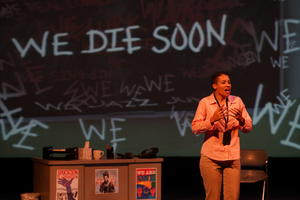Review: PIPELINE at Virginia Rep
Morisseau's widely produced play comes to Richmond
 Playwright Dominique Morisseau gives flesh and blood to the concept of the school-to-prison pipeline in her searing 2019 drama "Pipeline," now at Virginia Rep.
Playwright Dominique Morisseau gives flesh and blood to the concept of the school-to-prison pipeline in her searing 2019 drama "Pipeline," now at Virginia Rep.
The school-to-prison pipeline, according to the American Civil Liberties Union, is "a disturbing national trend wherein children are funneled out of public schools and into the juvenile and criminal justice systems. Many of these children have learning disabilities or histories of poverty, abuse, or neglect, and would benefit from additional educational and counseling services."
With deft plotting and fierce emotion, Morisseau flips that definition on its head for this play. The main character, Nya, teaches at an inner city public high school. But she and her ex-husband Xavier have seen to it that their teenage son Omari is being educated at an elite boarding school, hoping to shield him from the perils of the pipeline.
No such luck. Omari, feeling pressured at school, has assaulted a teacher. He may be expelled; the teacher may press charges. The teacher was badgering Omari to explain an aspect of Richard Wright's "Native Son" to his classmates--presumably because Omari was the only student of color in the class. It's one push too far for Omari, already under strain from many sources--his parents' divorce, his physical distance from home, his father's emotional distance. And, Morisseau implies, from the crushing burden of centuries of racism.
In 90 tense minutes director Katrinah Carol Lewis and her accomplished cast of six illuminate the story, sometimes with stark realism and sometimes with impressionistic interludes based particularly on Gwendolyn Brooks's poem "We Real Cool," which Nya teaches to her class.
Each character contributes to this tight drama, as do the actors who portray them. Sasha Wakefield is Nya, as afflicted as Omari by the pressures of racist society, with the added burdens of single parenthood and a deep sense of terror as she struggles to keep her son safe. Wakefield's performance is tough and strong, with fear under every move she makes. Trevor Lawson's Omari is charismatic as he strives to control his temper, trying to navigate the emotional waters of his relationships with both his parents and his girlfriend Jasmine (Jessie Jordan), a fellow Black student at the private school. Jordan's Jasmine is self-possessed and emotionally savvy as she sees Omari moving away from her.
Iman Shabazz plays Xavier with an underlying terror that matches Nya's, but he also carries a fundamental bewilderment with his son that leaves him defeated. Laine Satterfield plays Laurie, a white colleague of Nya's who is a battle-hardened veteran of the public school, shaken though she is by a recent injury she received at the hands of a student. And Todd Patterson is warm and tenacious as Dun, a security guard at Nya's school who's had a relationship with her that he'd like to rekindle.
There's a continual interplay between the harsh realities that bring Nya to a crisis and the emotional reenactment of "We Real Cool" as Omari recites it and as Dasia Gregg's angular projections convey it to Brian Barker's looming, spacious set. Steven Koehler's lighting subtly moves us through the emotional beats of the play. Kelsey Cordrey's sound design includes subtle background noises that, like Nia S. Banks's costumes, keep us rooted to place, but the voice amplification could be clearer.
Lewis's direction is simultaneously fearless and sensitive throughout, essential to bringing the audience along on this journey. And the end is hopeful, with Omari giving Nya his instructions for how to deal with him--just a few requests, perhaps deceptively simple, that any child would make of any parent. And that any parent would want to fulfill.
"Pipeline" at The November Theatre Arenstein Stage, 114 W. Broad St.
Through November 7
Tickets: $36-$56, with group rates and rush tickets available
Info: va-rep.org or (804) 282-2620
Photo credit: Jay Paul
Reader Reviews

Videos
